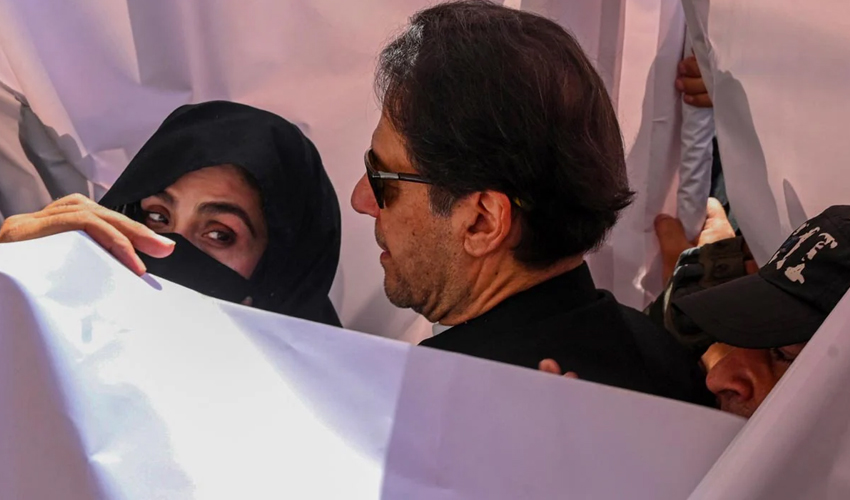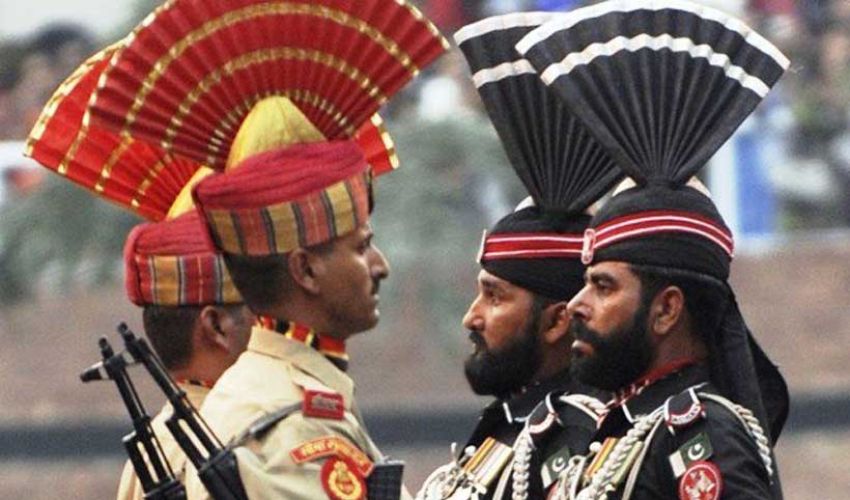The District and Sessions Court of Islamabad has reserved judgment on the appeals against the conviction of Pakistan Tehreek-e-Insaf (PTI) founder Imran Khan and his wife, Bushra Bibi, in the Iddat Nikah case.
The verdict will be announced on May 29.
District and Sessions Judge Shah Rukh Arjumand presided over the hearing. PTI’s lawyer, Usman Riaz Gul, appeared before the court, while Raja Rizwan Abbasi’s assistant counsel also made an appearance.
During the proceedings, the assistant counsel informed the court that Rizwan Abbasi was expected to present arguments, but the relevant records were not available with him. In response, Judge Arjumand asked Usman Riaz Gul to present his arguments. Gul assured the court that he would require 10 to 15 minutes for his arguments.
The court directed Khawar Manika, the complainant’s lawyer, to present arguments via video link at 1 PM. After a brief recess, the hearing resumed with PTI lawyers Usman Gill, Shoaib Shaheen, Zaheer Abbas, and Niazullah Niazi, alongside prosecutor Adnan Ali, present in the courtroom. The session saw a packed courtroom with PTI women workers, including PTI leaders Seemabiya Tahir and Shandana Gulzar, in attendance.
Judge Arjumand instructed Usman Gill to conclude the arguments. Niazullah Niazi, another lawyer for PTI, mentioned that Rizwan Abbasi was supposed to present further arguments. However, Judge Arjumand clarified that Usman Gill only needed to respond, as the main arguments were already complete.
Lawyer Usman Gill’s reply
Usman Gill pointed out that the complaint in the Iddat Nikah case was filed late, and there was a prior private complaint where Rizwan Abbasi served as the lawyer.
The lawyer argued that the court must scrutinise the evidence in both complaints filed against his clients.
Politically motivated
He emphasized the lengthy delay in filing the complaint, questioning why it took five years and 11 months to bring the case forward. He asserted that the case was politically motivated, aiming to target Imran Khan and Bushra Bibi.
Usman Gill, another PTI lawyer, highlighted that the first complaint was filed by Muhammad Hanif, a stranger to the parties involved, while the second complaint was lodged by Khawar Manika. Despite different complainants, the allegations against Imran Khan and Bushra Bibi remained the same in both cases.
He argued that the complaints were intended to damage the reputations of Imran Khan and Bushra Bibi. He explained that questioning Mufti Saeed was crucial to clarifying his role, noting that Mufti Saeed had previously been involved in regime change activities in the 1990s.
Gill also pointed out that Khawar Manika filed his complaint shortly after being released on bail in a corruption case, following Muhammad Hanif’s withdrawal of the initial complaint. He noted that both Hanif and Manika were represented by the same lawyer, Rizwan Abbasi, suggesting a coordinated effort to manipulate the legal process.
Prosecution’s reliance on a photocopy
Gill argued that the prosecution’s reliance on a photocopy of the divorce document was questionable, as the original document was not presented. He emphasized that the trial court had rejected his objection to the photocopy, questioning how a document with dubious status could be used in the judicial record.
He further contended that the prosecution failed to prove its case. Gill highlighted that the criminal court lacked the authority to declare a marriage valid or invalid, arguing that such matters fall under the jurisdiction of special courts. He stressed that a criminal hearing should only proceed if a family court declares a marriage illegal.
The lawyer pointed out that no marriage can be declared illegal without a family court’s declaration. He mentioned that former prosecutor Rana Hassan Abbas had presented the facts of the case before the court, which was then transferred the next day. This prompted a remark from Judge Shahrukh Arjumand, who humorously asked about expectations from the next steps, eliciting laughter in the courtroom.
Gill stated that after her divorce, Bushra Bibi returned to her parents’ house and completed her Iddat period before remarrying. He criticised the trial of the Nikah case during the Iddat period, noting that hearings were conducted even after court hours, which he claimed was illegal.
Completing his arguments, Usman Gill urged the court to annul the sentence and allow the appeals.
Prosecutor’s reply
Prosecutor Adnan Ali then began his cross-examination, focusing on the legality and punishability of marrying during the Iddat period. He asserted that the case was about whether it is permissible to marry during Iddat and if such actions are punishable. He emphasized that Iddat must be completed as it is integral to the validity of a marriage.
Ali clarified that he was not seeking to annul the marriage but pointed out that there is a punishment for marrying during Iddat. This statement led to PTI women activists in the courtroom chanting “Shame, Shame.”
The hearing concluded with Gill pleading for the appeals to be allowed and the sentence in the marriage case to be annulled.
In his concluding remarks, Prosecutor Adnan Ali referred to the judgments of the Supreme Court and pleaded for upholding the sentence while completing the reply.
Government requests for re-arguments
Prosecutor Adnan Ali requested to present arguments again on behalf of the government, objecting that he had not been heard previously. He stated that Prosecutor Rana Hassan Abbas had given arguments, but he had not. The court granted his request to present his arguments.
Prosecutor Adnan Ali’s arguments
Prosecutor Adnan Ali stated that Khawar Manika and Bushra Bibi had been married since 1989, enjoying a happy marriage for 28 years and raising five children together. However, he alleged that the intervention of the PTI founder led to their divorce. According to Ali, the PTI founder repeatedly interfered in the lives of Khawar Manika and Bushra Bibi.
The prosecutor further asserted that Khawar Manika claimed his home was destroyed due to the PTI founder's interference. Although Manika wished to reconcile, Bushra Bibi married during the period of Iddat. Witnesses testified under oath regarding these events, while the PTI founder gave his statement under Section 342 without taking an oath.
Prosecutor Adnan Ali argued that after 28 years of marriage, Khawar Manika’s reaction was natural given the circumstances. He noted that a video of Manika’s daughters was not presented as evidence because both Bushra Bibi and the PTI founder were against it. Ali emphasized that the presence of Mufti Saeed during these events was confirmed by photographic evidence.
The prosecutor pointed out that while it is widely known that the 90-day Iddat period must be completed, Bushra Bibi did not inform Mufti Saeed about the completion of her Iddat. The verbal divorce, he stated, was ambiguous with no clear details about when and in whose presence it occurred. He questioned why Mufti Saeed’s title was used selectively, highlighting inconsistencies in their statements regarding his involvement.
Adnan Ali stressed that Bushra Bibi remarried immediately after a verbal divorce, which he argued was against social norms and legal principles. He cited the Lahore High Court’s ruling that a marriage cannot be dissolved before the completion of the Iddat period. He further remarked on the influence of spiritual leaders, or Peers, in society, noting that such figures can have a powerful impact on individuals' decisions, sometimes leading to extreme actions.
The assistant counsel of the complainant lawyer Rizwan Abbasi pleaded for adjournment of the hearing and took the stand that Rizwan Abbasi will present arguments in the next hearing.
However, the court rejected the plea of the assistant counsel and reserved the judgment of the case. Later, the court staff informed that the judgment of the case will be pronounced on May 29, not today.



























